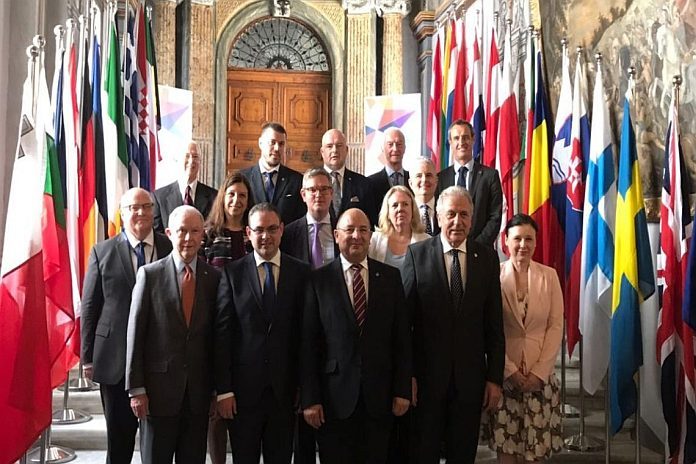WASHINGTON, USA — On December 11, the US-EU ministerial meeting on Justice and Home Affairs took place in Washington DC. The United States of America was represented by attorney general William P. Barr and acting secretary for Homeland Security Chad Wolf. The ministerial which is held twice a year aims to oversee transatlantic cooperation in the area of Justice and Home affairs and address common security threats.
The European Union was represented by the Commissioner for Justice Didier Reynders, as well as by Finnish Minister of Justice Anna-Maja Henriksson, Finnish Permanent Secretary of the Ministry of the Interior Ilkka Salmi, Croatian Minister of the Interior Davor Božinović, and Croatian Minister of Justice Dražen Bošnjaković, on behalf of the current and incoming Presidencies of the Council of the European Union. The meeting was also attended by assistant attorney General John C. Demers, the EU Counter-Terrorism Coordinator Gilles de Kerchove, the deputy secretary-general of the EEAS Christian Leffler, the deputy executive director of Europol Jürgen Ebner, and the vice president of Eurojust Klaus Meyer-Cabri.
As the EU begins a new political cycle, the United States and the EU reaffirmed their strong commitment to foster the Transatlantic Partnership and pursue their dialogue on Justice and Home Affairs, building on the existing operational cooperation and best-practice exchanges on matters of common interest.
Fighting terrorism in all its forms remains our top common priority. We concurred on the importance of continuing and expanding our efforts to identify and hold accountable all those who support or engage in terrorist activity, with a particular emphasis on the sharing of information gathered in zones of combat for use in criminal proceedings as admissible evidence. The importance of using this type of information to improve the security of our borders was also highlighted, especially in the context of returning foreign terrorist fighters.
We welcomed achievements in this domain, in particular, the US efforts to share information on foreign terrorist fighters with EU Member States and Europol. We called for continued engagement and ongoing operational cooperation between relevant agencies, building on the conclusions of the meeting on these subjects held in Brussels on July 10. We further discussed various forms of violent extremism, including ethnically- and racially motivated violent extremism, and we supported further expert exchanges to examine the international linkages among these groups.
The US-EU agreement on Passenger Name Records (PNR) remains an important instrument for enhancing the security of our citizens. In that context, we look forward to the final report following the joint evaluation. We reaffirmed our shared interest in establishing ICAO standards to encourage rapid and effective implementation of UNSCR 2396 for the use of PNR to combat terrorist travel, with full respect for human rights and fundamental freedoms.
Together we acknowledge that threats to security take on increasingly different forms, challenging our collective resilience. We discussed means to enhance cooperation on countering hybrid threats – including chemical, biological, radiological, and nuclear weapons, as well as explosives – and welcomed the US-EU experts seminar on that issue held in Brussels in September 2019. We also recognized the challenges to security presented by drones. We further discussed challenges to cybersecurity and updated each other on our respective efforts to assess and address 5G security challenges, including those impacting the security of our supply chain.
In particular, we discussed the need to work with industry to establish trusted markets for 5G and other telecommunications equipment and services. We will continue to keep each other informed of developments in this area and commit to approaching emerging technologies through a risk-informed perspective.
The United States and the European Union reaffirmed the importance of enhancing judicial cooperation in cyberspace, in particular with regard to cross-border access to electronic evidence. In this context, we welcome the negotiations for an US-EU agreement facilitating access to e-evidence for the purpose of judicial cooperation in criminal matters. We agreed to review progress in the negotiations at the next ministerial meeting in 2020.
Furthermore, we exchanged views on the ongoing negotiations for the Second Additional Protocol of the Budapest Convention and discussed the importance of making swift progress, in view of our joint and strong commitment to the Budapest Convention, which remains the instrument of choice for international cooperation on cybercrimes for both the EU and the United States.
We also acknowledged that the use of warrant-proof encryption by terrorists and other criminals including those who engage in online child sexual exploitation compromises the ability of law enforcement agencies to protect victims and the public at large. At the same time, encryption is an important technical measure to ensure cybersecurity and the exercise of fundamental rights, including privacy, which requires that any access to encrypted data be via legal procedures that protect privacy and security.
Within this framework, we discussed the critical importance of working towards ensuring lawful access for law enforcement and other law enforcement authorities to digital evidence, including when encrypted or hosted on servers located in another jurisdiction.
We reiterated a common commitment to enhance the resilience of our electoral systems and to combat any form of interference in electoral processes. In this context, we welcomed the outcome of the November 26 first experts’ meeting on the resilience of electoral systems. The event brought together specialists from both sides of the Atlantic to discuss respective approaches and share best practices; we look forward to continuing dialogues on this issue.
Finally, we welcomed Poland’s designation for the US Visa Waiver Program, which underscores the usefulness of the tripartite process and the encouraging progress made by four other Member States towards reciprocal visa-free travel under our respective legal frameworks. We are committed to continue working together, in the appropriate frameworks, to support the remaining four EU Member States in their efforts towards designation in the Visa Waiver Program.
Reaffirming our joint commitment to advance together towards common solutions in all these areas, we agreed to meet again in the first half of 2020 in Croatia.







